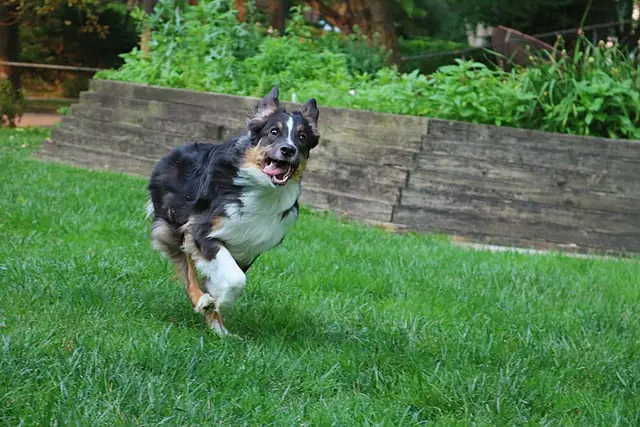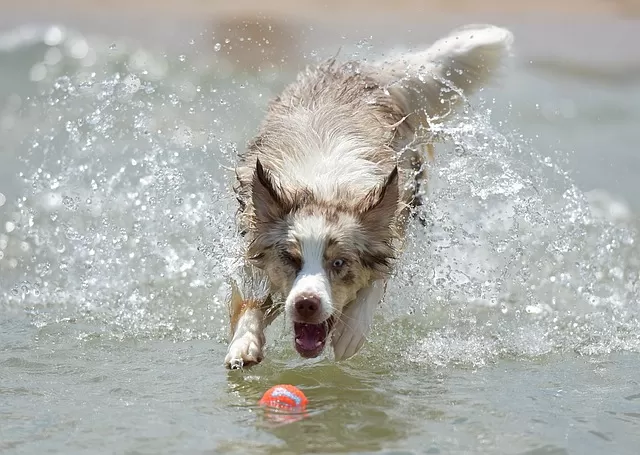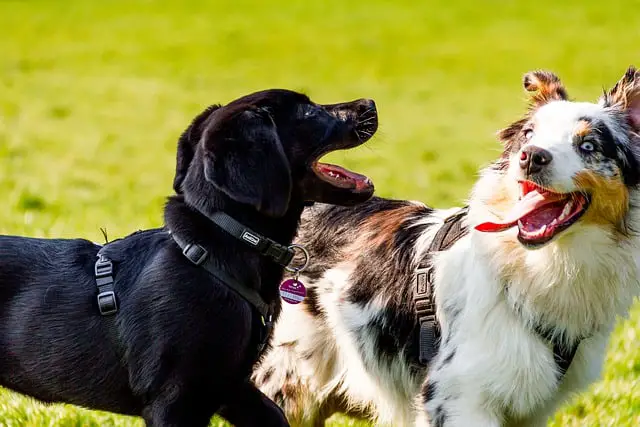Many breeds of dogs are known for their behavioral tendencies and temperament but sometimes, not in a good way.
When you mention Rottweiler and German shepherd, some people immediately think aggressive and this is usually not the case.
We must first consider that most dogs were originally bred to serve and perform a job. There are hunting breeds like Labrador and Golden retrievers, different setters, and pointers that were bred to hunt and retrieve game.
Rottweilers and German shepherds were usually bred as working dogs to guard or protect, although the German shepherd had a dual role of also herding sheep.
The Australian shepherd along with border collies was bred for herding sheep and cattle. All of the above breeds embody qualities and deep instincts for performing a job in a stellar way. It is sometimes when these breeds become family pets that behavioral issues arise.
If they do not receive proper exercise and mental stimulation, they can become bored. We have essentially removed or fired them from a job that is instinctual.
The Australian shepherd can become hyperactive and develop a whole array of behavioral problems if not trained properly. Being out of a job is not the only reason for such issues.
In this post, I will delve into Australian shepherd behavior problems, causes, how to deal with the issues, and what to do if your Australian shepherd is out of control and also an Australian shepherd biting strangers.

For your dog’s vitamin supplement, food, toys, or other dogs product please visit the Sundays for dogs website.
Australian Shepherd Behavior Problems and Causes.
The Australian Shepherd is intelligent, very easy to train, energetic, and hardworking. Being a herding breed, they are used to rounding up sheep, protecting them, and being in control.
The being in control tendency can prove to be a problem for an Aussie who is a family dog as you are the pack leader and the one who should always be in charge.
They also tend to herd people and children by nipping at heels, which needs to be addressed and “nipped” in the bud. The causes of behavioral issues are listed below.
- genetics – Sometimes genes and heredity play a role in issues that are behavior-related.
- socialization – puppies should have enough time to be socialized with their mother and littermates as well as being socialized when going to their new home by being introduced to as many different people, places, situations, sights, sounds and smells as possible for a well- rounded pup and one that is comfortable and not fearful in any situation.
- training – Training in all areas plays a key role in avoiding behavior problems.
- discipline – Teaching your pup what is expected and not allowed is necessary without yelling or physical punishment but with firmness and consistency.
- boredom – Australian shepherds will become bored without enough physical and mental stimulation. Plenty of exercise and games are a plus.
To check your shepherds’ health status or their DNA checks, please visit the Embark vet website for all the help you may need.

Behavior Problems
Most pet owners do experience a few behavioral issues, especially in puppies. Puppies do need to be trained and learn what is expected of them.
There does need to be disciplined, not with physical punishment but by letting your pup know that a certain action is wrong and always giving positive praise and reinforcement for a job well done.
It is when your pup begins having continual behavior issues that you need to step up your game to avoid this being the norm. Some various behavioral problems are listed below.
- Barking
barking – Your Australian shepherd may begin barking when everyone in the household is excited about something and want to join in the fun, or when the doorbell rings.
When barking becomes constant it not only annoys you but perhaps the neighbors too. Use a phrase like “quiet pup” in a happy tone and practice this to get your Aussie’s attention.
Give them a treat and use this to quiet them every time until they get the picture. No quiet, no treat.
- Nipping
Nipping – Nipping while playing hurts. Let your pup know it hurts by saying “ouch!’ Then walk away and ignore them.
When the pup is calm again, resume play. Repeat and ignore if they begin nipping. They will soon identify that nipping equals no playing or attention.
- Chewing
Chewing – Chewing is natural for dogs and especially for puppies. Puppies need to chew when they are teething to help alleviate pain.
It is when chewing turns destructive that it becomes a behavioral issue, if continual. Puppies may shred a pillow, etc.
Because they need to chew and that is what they found. Puppies and adults need training as well as appropriate chew toys.
There are many on the market for teething and for adult Aussies. Giving your pup acceptable toys is essential not only for keeping them away from furniture, but will occupy them for hours.
- Jumping
Jumping – Jumping is another behavior problem that may seem cute as puppies but can be very annoying and even dangerous for an adult.
Aussies can be quite exuberant when greeting guests and knocking down an elderly person is not a very welcome greeting. From the start, your pup should be taught that jumping is not acceptable.
Either bringing your knee up when they jump, dropping a loud clattering cookie sheet, or turning and ignoring them until they settle down are a few ways to deter this activity. Consistency is key and good positive attention is given to a well-behaved shepherd.
- Digging
Digging – Digging is another instinctual trait of most dogs but is not acceptable when they are digging holes all over your yard! Either has plenty of toys for them outside, play games for exercise and to reduce boredom, or create their very own “dig” area where they can be free to dig away.
- Begging
Begging is never a good trait. Do not give pup food while you are eating or snacking. They will expect this every time, it will not go over well with guests and it will also not be your pup’s fault because you started it.
- Herding and Nipping
Herding and Nipping – Since the Australian shepherd is a herding breed, they may try to round up your family every time things get loud and noisy and everyone is headed in different directions. They may bark and nip at heels, which may frighten children.
This is when training is essential and the pack leader needs to be assertive. Stopping in your tracks and ignoring until the pup is calm again will help. They will realize it is unacceptable behavior and they get no attention for the behavior.

Australian Shepherd Out of Control
With the above tips, hopefully, you will avoid an out-of-control Australian shepherd. To regain control for a well-behaved and obedient Aussie, first, you must determine why your Aussie is out of control. Below are some of these reasons.
- Exercise/Boredom – Your Australian shepherd needs plenty of exercises to get rid of all of the energy they have. They often become bored or destructive otherwise.
- Overtired – Your pup does need its rest. Just like a toddler, if they don’t get their rest and a few naps, they will become cranky, and destructive and may challenge the pack leader too.
- Health condition – If being out of control comes on suddenly, this may be caused by a health condition worth checking out.
- Socialization – Without proper socialization, Australian shepherds can become fearful and aggressive towards strangers.
- You – Yes, you may be the cause of an out-of-control Aussie if you are not consistent and waffle all the time with rules. They need boundaries.
Australian Shepherd Biting Strangers
You do not want your Australian shepherd to bite anyone. This can end in a bad way for both the victim and your Aussie. Preventing your dog from biting and understanding what sets them off is how to solve this. Some reasons are below.
- Teething – Puppies’ teeth still do hurt like little razors but they do sometimes want to bite or chew.
- Desire to herd – This is due to their herding instinct and they may nip. You may need professional help if you don’t squelch this desire as a puppy.
- Anger/Fear – If your pup is not properly socialized they can be fearful or become angry in certain situations which can lead to biting.
- Guarding – Australian shepherds not only herd but guard their sheep. They may bite, thinking they are defending you against someone.
- Health – A health issue, causing them pain may also contribute to a dog bite.

Here are a few tips to help deal with biting or an out-of-control Aussie.
- Training classes – Training is needed for all breeds and classes are especially helpful because you learn how to train and your pup gets some social interaction with other dogs and people.
- Keep on Leash – If you know that your Aussie will bite or has bitten, keep them on a leash with a firm hold in all social situations and even consider a muzzle for everyone’s protection.
- No yelling or Hitting – Never get out of control yourself by yelling or hitting your pup. This is not the way to teach them that biting is wrong.
- Reward – When your pup is calm and behaves well give them plenty of praise with positive reinforcement.
- Get help – If your Australian shepherd is out of control or, biting, seek help from your veterinarian or a behavioral therapist and do it sooner than later.
Australian shepherds make wonderful family dogs but, especially as puppies, things will not always go smoothly.
If the pup is sometimes disobedient, this does not mean there are underlying behavioral issues. This just means they are testing you and need more training, discipline, and socialization.
If you feel that you do have a problem and you’re getting nowhere, speak with your veterinarian for advice, and don’t wait until you are struggling.
Australian shepherds are very bright dogs and catch on quickly. As an older adult Aussie, you won’t even remember any issues you had training your well-mannered pup.